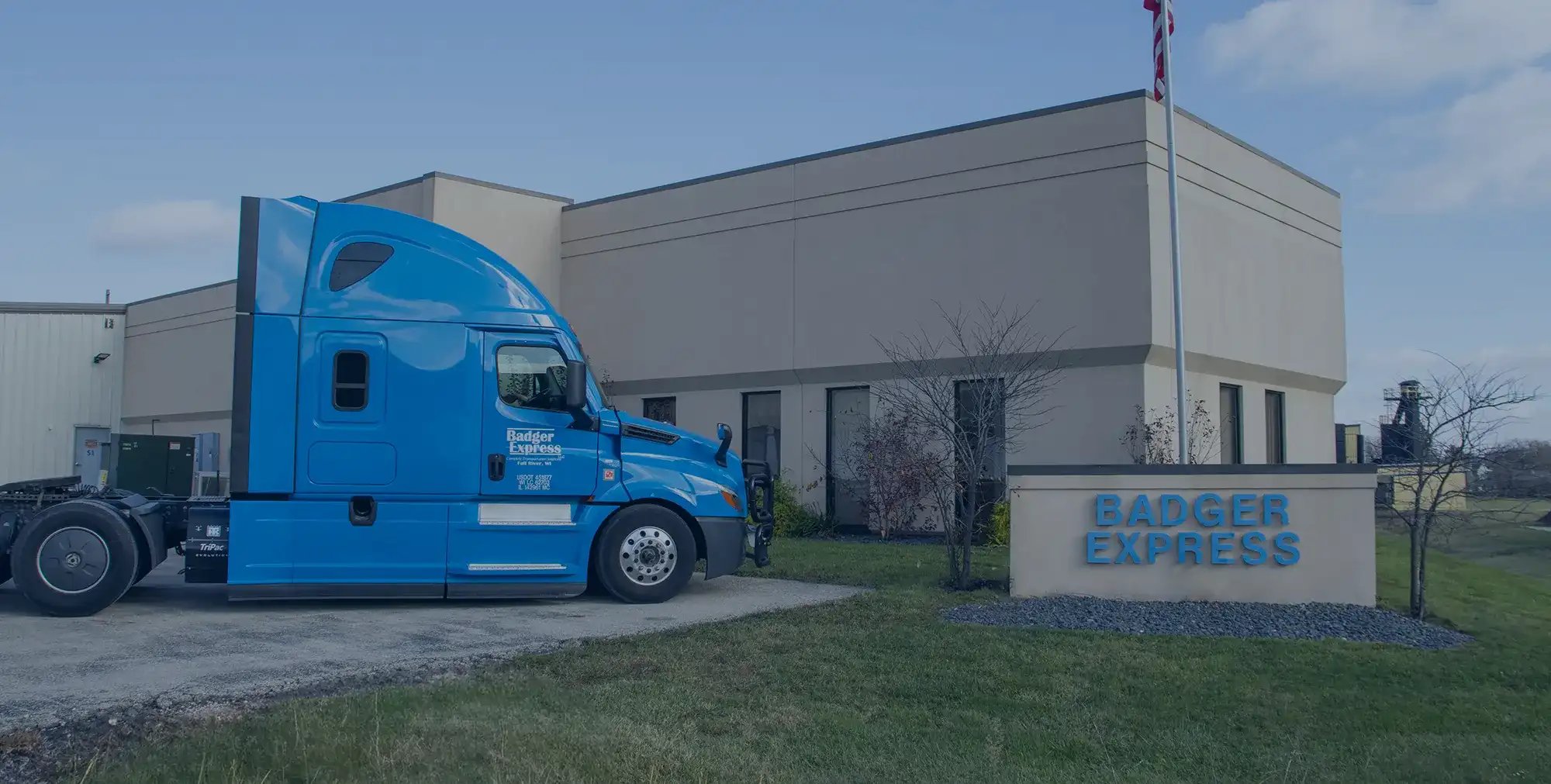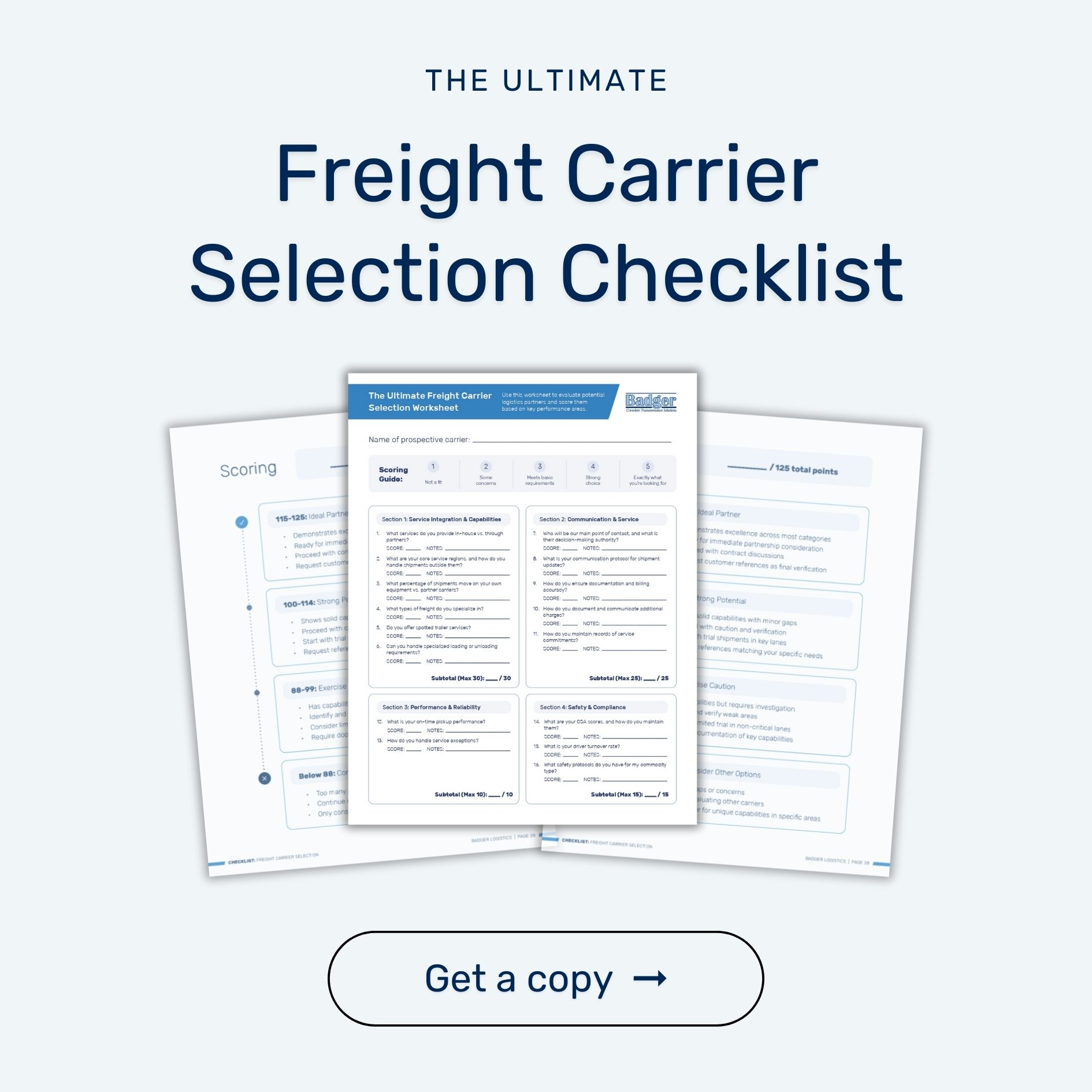Key takeaways
- Food safety starts with dedicated food-grade trailers, proper sealing protocols, and drivers trained in compliance requirements.
- Look beyond price to total value — on-time performance (our 97% rate), flexibility, and consistent capacity are worth the investment.
- Integrated services like drop trailer programs and warehousing can dramatically improve efficiency and inventory management.
- Mid-sized carriers offer the best balance: enough resources to be reliable, but small enough to provide personalized service.
Badger Logistics provides integrated transportation solutions combining asset-based trucking, brokerage services, and warehousing to overcome Wisconsin's unique logistics challenges. Learn more about our Wisconsin shipping expertise or get a competitive rate quote to join 500+ shippers solving their freight challenges with one call.
We move food and beverage products efficiently between manufacturing facilities, distribution centers, and warehouses with our dry van fleet or temperature-controlled carrier network. Maintain complete product integrity while maximizing dock space through strategic drop trailer programs.
A brief introduction
After more than 25 years in the transportation industry, I've seen firsthand what makes for successful partnerships between food manufacturers and their carriers.
Food and beverage logistics present unique challenges that require specialized knowledge and capabilities. When your products directly impact consumer health and safety, there's simply no room for error.
Here are my essential best practices for food and beverage companies looking to optimize their freight transportation.
1. Prioritize food-grade equipment and handling
The foundation of successful food transportation starts with proper equipment and protocols:
- Dedicated food-grade trailers: Make sure carriers use trailers that exclusively haul food products or food-related items. At Badger Express, our 53' dry van fleet is dedicated to food products and food-grade materials, eliminating cross-contamination risks from previously hauled items like oil, scrap paper, or any products that could harbor contaminants.
- Clean, well-maintained equipment: Walls should be intact, floors should be clean, and there should be no moisture present. These issues can lead to rejected loads and significant delays. Our rigorous inspection protocols ensure every trailer meets strict cleanliness standards.
- Proper sealing protocols: Once loaded, all food shipments should be properly sealed with documentation. This isn't just good practice—it's often required by regulation. Our drivers are thoroughly trained in Food Safety Modernization Act requirements, including proper sealing procedures.
- E-tracking for load securement: For food products, proper securement isn't just about preventing damage—it's about preventing contamination risks when products shift during transit. Our tracking systems and load securement protocols protect your product throughout its journey.
2. Look beyond price to total value
While it's tempting to focus solely on rates, especially in today's challenging economic environment, food manufacturers should evaluate carriers based on their total value proposition:
- On-time performance: Our on-time ratio with our top food customers is 97%. This level of reliability is critical when dealing with strict delivery windows and potential fines. Many major receivers like Walmart impose significant penalties (often $300+ per hour) for early or late deliveries.
- Partnership approach: The most successful transportation relationships I've seen are true partnerships rather than transactional arrangements. At Badger, we pride ourselves on being flexible when unexpected needs arise, whether that's weekend work or accommodating last-minute schedule changes. As one of our customers, Charter NEX, put it: "Basically anything we've ever asked, they've done."
- Consistent capacity: Food production rarely stops, so your transportation solution shouldn't either. We offer both RFP contracting with dedicated capacity for predictable pricing and spot market options to match your specific needs and provide stability during market volatility.
3. Consider integrated logistics services for maximum efficiency
One trend I've observed is food manufacturers increasingly looking for integrated services rather than piecemeal solutions:
- Drop trailer programs: Having carriers drop trailers at your facility allows you to load product when it's ready rather than being constrained by live loading schedules. This flexibility can dramatically improve your dock efficiency and production flow. Our extensive drop trailer network helps customers like Charter NEX load trailers at night or whenever convenient, keeping inventory levels optimized.
- Warehousing integration: Consider carriers that also offer food-grade warehousing. Badger provides over 210,000 square feet of FDA-registered warehousing for both finished goods and packaging materials. This integration allows for more fluid supply chain management, particularly for manufacturers needing to consolidate shipments or manage inventory fluctuations.
- Inner plant movements: For larger manufacturers with multiple facilities, having a carrier that can efficiently move product between your plants, production facilities, and distribution centers creates significant efficiency. Our expertise in inner-plant transfers helps manufacturers maintain consistent production schedules.
4. Choose the right-sized transportation partner
In my experience, the size of your carrier matters significantly. While major national carriers have their place, mid-sized carriers often provide superior service for food manufacturers:
- Direct communication: With larger carriers or brokers, information often passes through multiple hands—sales to customer service to carrier relations to the actual driver. Critical details get lost in this game of telephone. At Badger, our single-point-of-contact approach means you work with dedicated account managers who understand your business and requirements.
- Responsive problem-solving: When issues arise—and they inevitably will—having direct access to decision-makers can make all the difference in resolving problems quickly. As a mid-sized carrier, we combine the reliability and infrastructure of larger providers with the personalized service and flexibility of a smaller partner.
- Willingness to accommodate location challenges: Some food manufacturing facilities are located in areas that create "deadhead miles" (unpaid miles) for carriers. The right partner will value your business enough to work through these challenges rather than simply abandoning the relationship when a more convenient opportunity arises.
5. Balance asset-based and brokerage services
Many food manufacturers prefer asset-based carriers over brokers, and for good reason:
- More control: Asset-based carriers control their own equipment and drivers, allowing for more consistent service. Our fleet of clean, well-maintained 53' dry van trailers and experienced drivers trained in food safety protocols ensures this control.
- Fewer information breakdowns: With brokers, information passes from customer to broker to carrier dispatcher to driver. Each handoff creates opportunities for misunderstandings or omissions.
- Driver education: Asset-based carriers typically have drivers better trained in food handling requirements and regulations like the Food Modernization Act.
That said, each approach has its place. For temperature-controlled shipments or when additional capacity is needed, our brokerage services maintain the same high standards through thorough carrier vetting and clear communication protocols. We serve customers like Galloway Company who ship various food-grade products including creamers and milk, sometimes requiring reefer trucks or tanker-endorsed drivers.
Final thoughts and next steps
The most successful food manufacturers I've worked with view transportation not as a commodity but as a strategic partnership. They understand that the lowest rate doesn't always deliver the best value, especially when product integrity, compliance, and on-time delivery are non-negotiable requirements.
With Badger Logistics, you get more than a service provider—you get a relationship-focused partner who understands the complexities of food-grade transportation and provides tailored solutions to drive your success. From inner-plant transfers to DC deliveries, we help manufacturers maintain product integrity and meet strict delivery windows.
|
Here's why shippers choose us for their food-grade freight:
|
Talk to us for a better Wisconsin logistics experience

At Badger Logistics, we combine asset-based trucking with extensive brokerage capabilities, warehousing, and maintenance services to provide integrated logistics solutions for Wisconsin shippers. This guide reflects not just my personal experience but the collective wisdom of our team, which brings over a century of combined Wisconsin logistics experience to every shipment we handle.
While freight transportation will always involve challenges, the right approach and partnerships can transform logistics from a constant struggle into a sustainable competitive advantage. I hope this guide helps you navigate Wisconsin's unique shipping environment more effectively.
For specific questions or to discuss your particular freight challenges or to get a competitive quote, feel free to reach out directly or submit the quote request form below. We'll be in touch within one business day.




